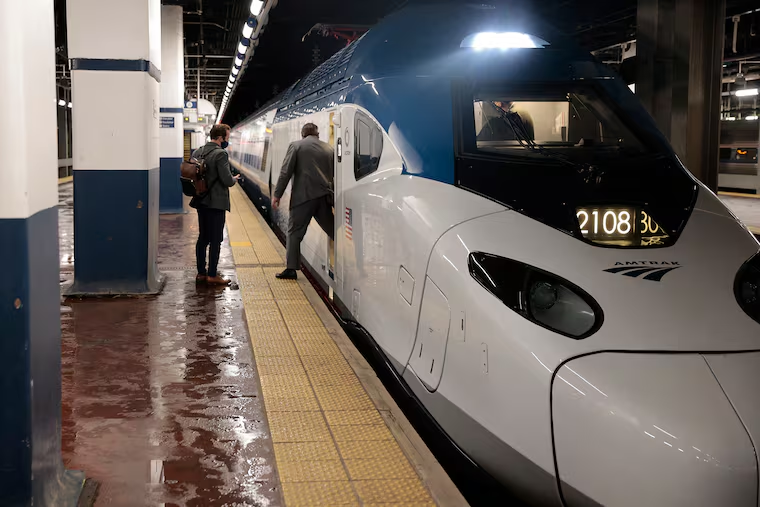Amtrak’s inspector general says first of new $2 billion Acelas don’t meet federal standards
The first of the new trainsets were scheduled to go into service in May of 2021. Now, the new Acelas are projected to begin carrying passengers in the second half of 2024.

Amtrak’s next-generation Acela program, already three years behind, risks further delays and higher costs because the manufacturer’s designs have not yet met federal safety standards and each nine-car train set it has produced has defects, according to a report from the Amtrak Office of Inspector General.
The performance audit, which spanned November 2022 through August 2023 and was released on Tuesday, offered detailed critiques of how Amtrak and its vendor, Alstom, have managed the $2 billion effort to replace the Acela express trains that have run on the Northeast Corridor since 2000.
To take their place, Amtrak ordered 28 Avelia Liberty high-speed train sets in 2016, and Alstom, a French multinational company, is building them in its Hornell, N.Y., factory.
The first of the new train sets were scheduled to go into service in May 2021, the report said. Now, the new Acelas are projected to begin carrying passengers in the second half of 2024, the report said — with the last train sets delivered about June 2025. There could be additional delays, the OIG report said.
“We want our customers to experience these new trains as soon as possible, but as noted in the report, Amtrak cannot operate them for passenger service until Alstom has completed testing and meets all safety requirements,” said Laura Mason, Amtrak’s executive vice president of capital delivery said in a statement.
She said the company is working closely with Alstom to meet the Federal Railroad Administration (FRA) requirements for the computerized testing models.
The report said the manufacturer had submitted 14 different versions of a testing model to the regulatory agency, which rejected them. Alstom has previously said it has found it difficult to properly measure how its newer technology, based on high-speed European trains, would perform on the aging tracks of the corridor.
“In addition to ongoing modeling activities, we have already successfully run these trains on the FRA’s Pueblo, Colo., test track at high speed and on the Northeast Corridor for a total of nearly 70,000 miles” in field tests, said Alstom spokesperson Clifford Cole.
The delays already are costing Amtrak “millions of dollars” in lost revenue because the trains can carry 378 passengers, compared to 304 on the existing model, the report said. “Further, the reliability of its current aging Acela fleet is declining, causing more on‐time performance delays and forcing the company to modify its Acela timetable,” the report said.
The report identified defects in the 12 train sets Alstom has completed, including:
How water drains between passenger cars, causing components that hold the cars together to corrode, which poses safety concerns.
Leaks in the train sets’ hydraulic tilting systems designed to help them negotiate curves more smoothly and faster.
Spontaneous shattering of five windows.
Misaligned ceiling tiles in the cafe cars and the laminated floor separating from the subfloor, making for an uneven surface.
Cole, of Alstom, said that it had already shipped nine train sets to Amtrak, with the railroad’s approval after strict inspections and that they are working on fixes as well as additional changes requested by Amtrak.
“These modifications will be completed before final acceptance of the train sets, as it is foreseen in the contract and customary in our industry,” he said, adding that the work will not block the project.
The new Acela trains are articulated, with one set of wheels placed between cars so it doesn’t rock so much, and they are 25% lighter than current Acelas. They have a top-rated speed of 160 mph, but travel times between Boston and Washington won’t improve significantly without upgrades to the infrastructure along the corridor.
Amtrak is working on that, slated to spend up to $6 billion in track, bridge, and tunnel improvements through 2027, but a federal commission has estimated $120 billion in repairs are needed before the trains can reach 160 mph on the entire length of the Northeast Corridor.
Today’s Acelas can reach 150 mph, but only on some parts of the route.